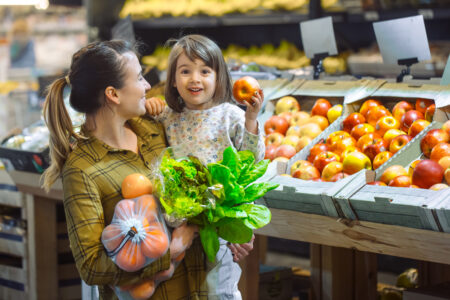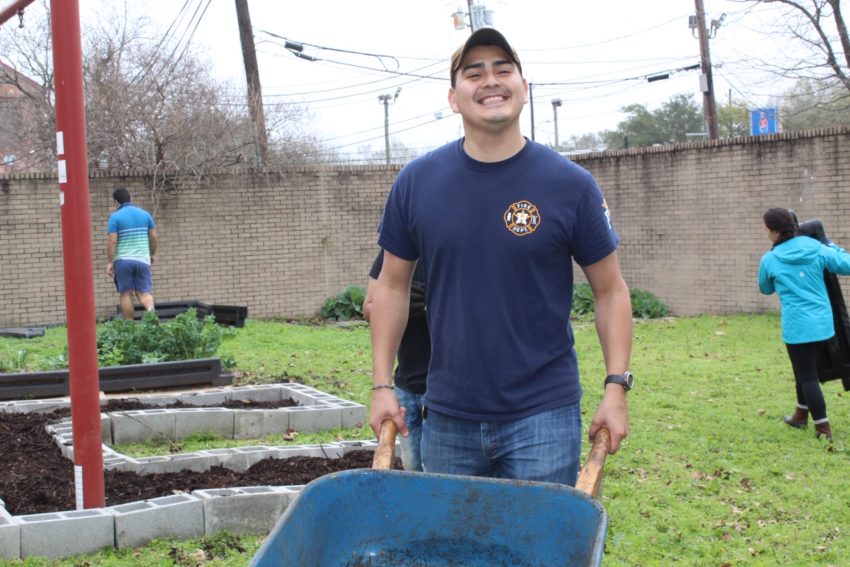
Share On Social!
Magnolia Park is one of the oldest Latino neighborhoods in Houston’s East End.
Unfortunately, its 17,800 residents live in a food swamp. Fast food access is abundant. Healthy food access is scarce, as are safe spaces to be physically active.
Jorge Olvera wanted to boost healthy food and physical activity at the same time.
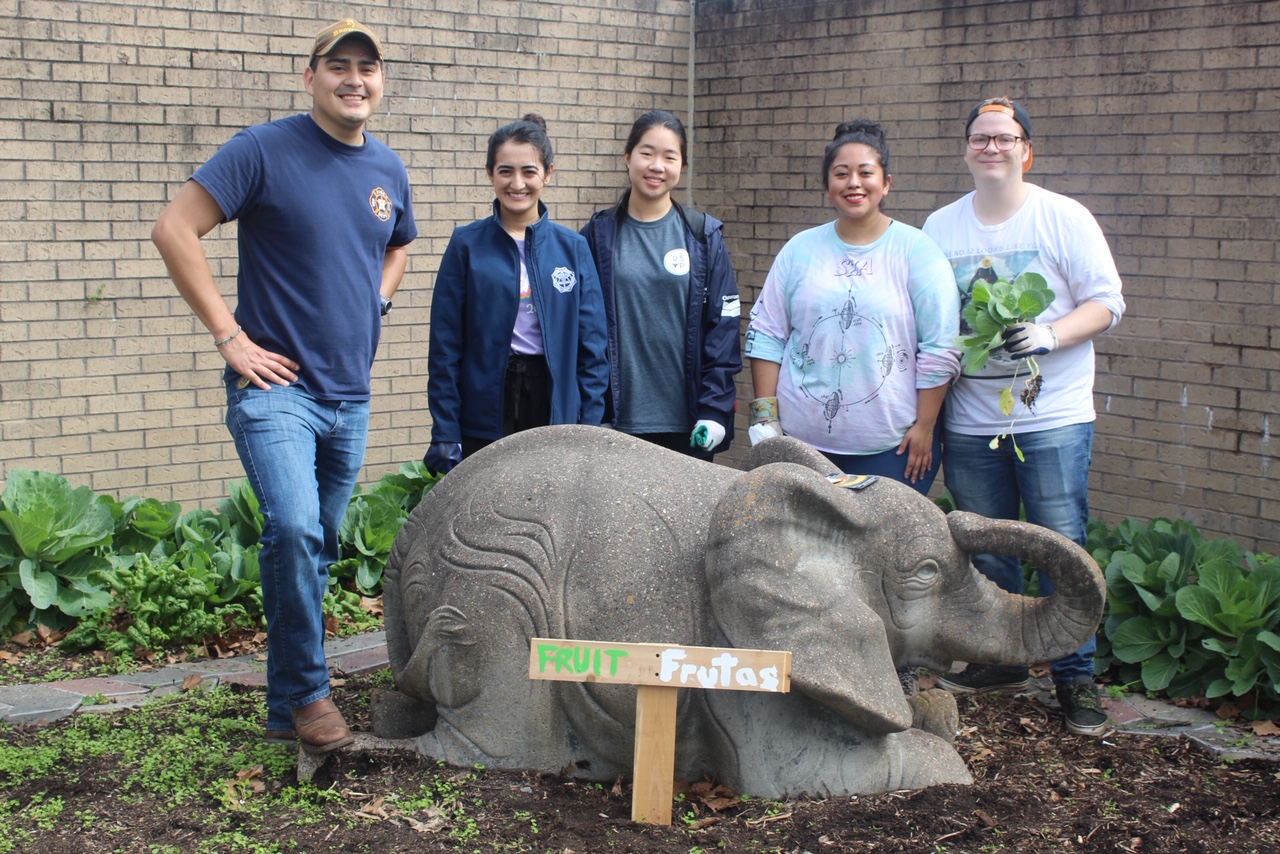
His big idea? Community gardening.
“A great strategy for addressing [food swamps and hunger] is to provide community members a safe space to grow their own food,” Olvera said.
The Great Need for Healthy Food in Magnolia Park
Olvera works for El Centro De Corazon, a federally qualified health center.
He witnessed the health center serving a growing amount of Magnolia Park and East End patients who had debilitating chronic and obesity-related diseases.
These diseases were often linked to poor nutrition and lack of physical activity.
“Not only is this area a food swamp, Olvera told Salud America!, “but many community members are food insecure as well.”
This problem of food swamps and food insecurity plagues many U.S. Latino communities.
In Harris County, 16.6% of people are food insecure. This means 1 in every 6 households do not have consistent access to enough food due to money or other resource issues.
Families here have little choice in the type of food they eat, Olvera said. They are targeted by fast food chains. They do not have not healthy food options.
“For families who are food insecure, buying a $5 pizza that can feed the entire family might be the only choice they have,” he said. “So a food insecure person could actually be obese or overweight. And when these choices are made, other health problems could also arise.”
The Big idea: Community Gardens
Olvera knew that community gardens could serve as an oasis amid the food swamps and food insecurity.
“As cliche as it is, this is where I tell you about how if you give a man a fish you can feed him for a day, but if you teach him to fish, he will eat for a lifetime,” Olvera wrote in an East End Block Party blog post. “When it comes to food insecurity, there is truth to that.”
A community garden is a “cool way” to subsidize healthy food when times are tough, Olvera said.
Gardens have others benefits, too.
“Community gardens increase access to healthy foods, improve nutrition and exercise, and improve consumption of fruits and vegetables,” Olvera said. “Gardens also build a sense of community and promote safer neighborhoods”
So could he push to start a garden in Magnolia Park?
Reinvigorating a Community Garden
Olvera found an abandoned garden at the Magnolia Multi Service Center.
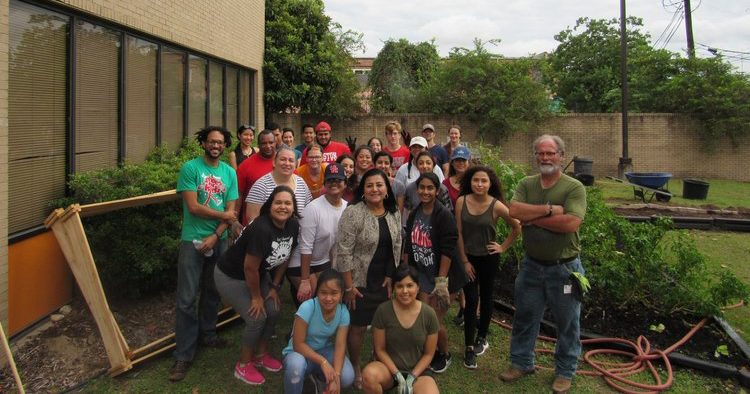
He asked community members about it. They showed great interest.
“I noticed people had an interest in gardening, but didn’t know where to go for help,” Olvera said. “They didn’t know how to get started.”
Olvera began organizing partnerships to revitalize the garden.
Community residents and groups—Houston Health Department, East End Block Park, and many more—came together to help.
Thus, the East End Garden Collaborative was born.
The collaborative aims to promote community gardens and share resources, leverage possible sponsorships, generate volunteers, promote healthier lifestyles, and increase access to healthy foods.
On a volunteer workday at the new community garden at Magnolia Multi Service Center in October 2018:
- El Centro de Corazon harnessed community energy around gardening and brought collaboration.
- University of Houston students worked to build new garden beds.
- Houston Health Department master gardener Joe Icet provided knowledge and helped manage volunteers.
- Buffalo Bayou Rowing Center helped haul 2,000 pounds of reusable bricks.
- Finca Tres Robles, an East End farm, gave starter seedlings to plant in the garden.
- Gallegos Elementary School helped and donated cinder blocks to build more garden beds.
“In the span of 3 hours, our volunteers were able to set the garden up for success in a way that would not have been possible without a lot of collaboration, education, and support from the community,” wrote Christi Vasquez in an East End Block Party blog post. “We saw the garden transform before our very eyes!”
The Garden’s Big Impact
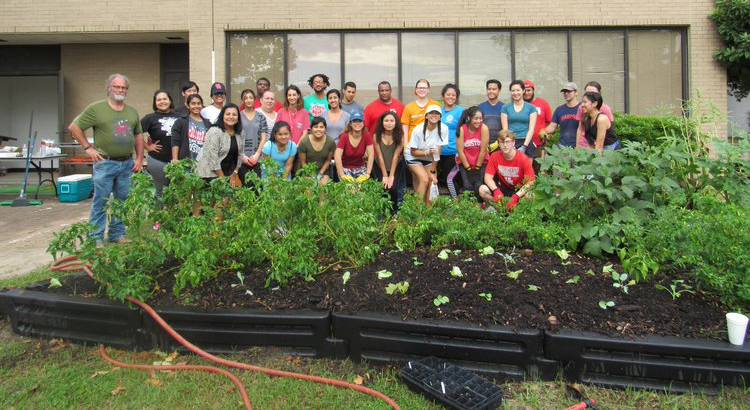
More than 120 pounds of produce have been harvested from community garden at Magnolia Multi Service Center.
This produce is then distributed in the form of a community basket at an El Centro de Corazon clinic.
The garden helps food-insecure families, Olvera said.
People working in the garden also have gotten physical activity. Neighbors are becoming more socially connected and civically active. A resident, Yarmilla Reyes, is helping coordinate the garden collaborative.
Many people are benefiting in many ways, Olvera said.
Schools Getting Involved in Gardening, Too
The collaborative is providing assistance to a half-dozen local community gardens.
They also are helping about a dozen local schools that have their own gardens.
“Educating students about growing their own food, and just gardening in general, is vital,” said Olvera.
For example, Olvera connected with Kareem Alston, an art teacher at Gallegos Elementary School in Houston ISD who is trying to expand gardening in schools.
One of the collaborative’s long-term goals, Olvera said, is to start a feeder program to teach students gardening in elementary through middle school. This program also will build students’ leadership skills and responsibility.
“One of our goals is to make [the community garden at Magnolia Multi Service Center] a space for students who work their own schools’ gardens, but can’t access them during school breaks, or students who have graduated and want to continue growing as gardeners,” Vasquez said in her East End Block Party blog post. “We’ve had an amazing outpouring of support from area schools.”
Want To Start a Healthy Change in Your Community?
The people who need help the most, or want to be involved, often don’t know where to turn.
Groups can step up to create opportunities.
El Centro de Corazon, for example, in addition to the garden collaborative, provides free fruits and vegetable prescriptions to the local farmers market. This helps families engage with the clinic’s registered dietician.
Also in Houston, Dr. Ann Barnes of Legacy Community started a farmer’s market inside her clinic. She can prescribe patients with fresh fruit and vegetables, then point them down the hall to get some.
Houston’s Brighter Bites program, founded by Lisa Helfman, sends students home with free fresh produce.
Our team at Salud America! partnered with Jenny Arredondo, nutrition coordinator at San Antonio ISD, to create an action pack to help start School Food Pantries to fight food insecurity across Texas.
Efforts like these often start with a conversation, Olvera said.
“Preach it. Preach it at all times,” he said. “Talk. Talk to everyone. Make your own connections work for you.”
“Start the conversation.”
Explore More:
Healthy FoodBy The Numbers
142
Percent
Expected rise in Latino cancer cases in coming years
This success story was produced by Salud America! with support from the Robert Wood Johnson Foundation.
The stories are intended for educational and informative purposes. References to specific policymakers, individuals, schools, policies, or companies have been included solely to advance these purposes and do not constitute an endorsement, sponsorship, or recommendation. Stories are based on and told by real community members and are the opinions and views of the individuals whose stories are told. Organization and activities described were not supported by Salud America! or the Robert Wood Johnson Foundation and do not necessarily represent the views of Salud America! or the Robert Wood Johnson Foundation.


